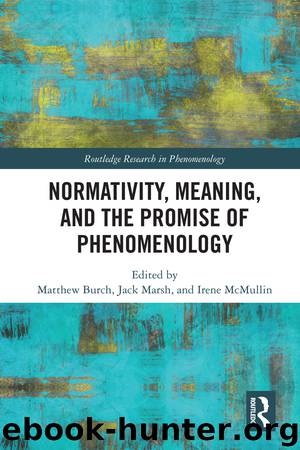Normativity, Meaning, and the Promise of Phenomenology by Burch Matthew;Marsh Jack;McMullin Irene;

Author:Burch, Matthew;Marsh, Jack;McMullin, Irene;
Language: eng
Format: epub
Publisher: Taylor & Francis (CAM)
Published: 2019-05-03T16:00:00+00:00
Placing Intentional Norms in Nature
Crowell concurs with McDowell on the idea that “the challenge is to say how the world can be independent of our thinking while still having a rational—and not merely causal—bearing on what we think” (Crowell 2010, 153). This challenge can be put in terms of two generally accepted conditions for establishing what counts as contentful normativity: (1) the objectivity condition: that contentful states must be about an independent world they can fail to adequately represent, and (2) the first-person condition: that intentional states must not be merely cases of acting “according to a norm”—the kind of normativity that applies to phenomena under scientific nomological generalizations—but rather cases of acting “in virtue of a norm,” i.e., states of subjects who are conscious of, responsive to, and responsible for the norms specified by said states. It is this first-personal kind of normative relation that holds for states in the space of reasons.
Crowell (2008, 2012a) himself acknowledges the need for accommodating these conditions in accounting for perceptual states. According to Crowell, unlike Sellars and Brandom for whom “perception plays no justificatory role but is just an entry move into the realm of inferentially governed conceptual relations” (Crowell 2010, 150–1), McDowell correctly saw that experience, along with other rational states, belongs in the space of reasons. But, in his view, accommodating (1) and (2) is paramount for reclaiming a role for the notion of “experience” as conceived in the phenomenological tradition and not merely in the way McDowell seeks to incorporate it.
Notably, both McDowell and Crowell agree that a correct account of intentionality involves a commitment to some form of empiricism (McDowell 1996, xviii; Crowell 2001, 19). However, it is at this point that Crowell introduces his criticism of McDowell’s position, namely, that the latter fails to provide an adequate notion of experience:
McDowell seems to hold that perceptual content must have a conceptual structure since only predication, an operation with concepts, establishes the object as a norm, places it in the space of reasons. But just this point makes McDowell’s position elusive, for in perception no such predication takes place.
(Crowell 2013, 126)
Download
This site does not store any files on its server. We only index and link to content provided by other sites. Please contact the content providers to delete copyright contents if any and email us, we'll remove relevant links or contents immediately.
The remains of the day by Kazuo Ishiguro(8977)
Tools of Titans by Timothy Ferriss(8366)
Giovanni's Room by James Baldwin(7330)
The Black Swan by Nassim Nicholas Taleb(7109)
Inner Engineering: A Yogi's Guide to Joy by Sadhguru(6785)
The Way of Zen by Alan W. Watts(6601)
Asking the Right Questions: A Guide to Critical Thinking by M. Neil Browne & Stuart M. Keeley(5759)
The Power of Now: A Guide to Spiritual Enlightenment by Eckhart Tolle(5757)
The Six Wives Of Henry VIII (WOMEN IN HISTORY) by Fraser Antonia(5501)
Astrophysics for People in a Hurry by Neil DeGrasse Tyson(5182)
Housekeeping by Marilynne Robinson(4436)
12 Rules for Life by Jordan B. Peterson(4299)
Double Down (Diary of a Wimpy Kid Book 11) by Jeff Kinney(4261)
Ikigai by Héctor García & Francesc Miralles(4247)
The Ethical Slut by Janet W. Hardy(4242)
Skin in the Game by Nassim Nicholas Taleb(4239)
The Art of Happiness by The Dalai Lama(4125)
Skin in the Game: Hidden Asymmetries in Daily Life by Nassim Nicholas Taleb(3991)
Walking by Henry David Thoreau(3953)
